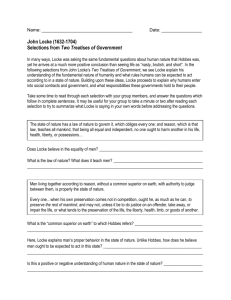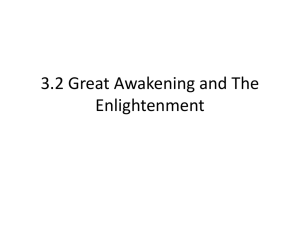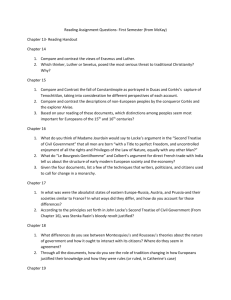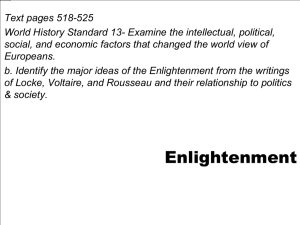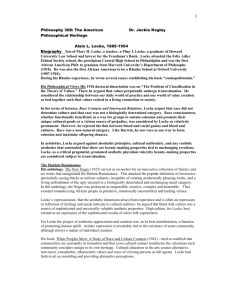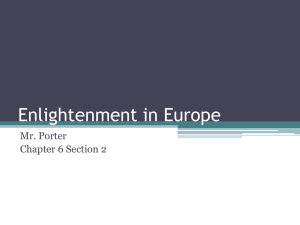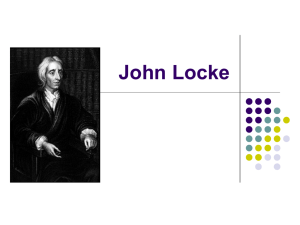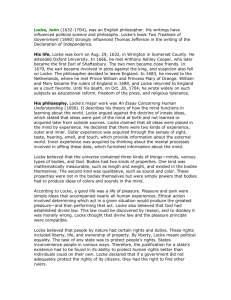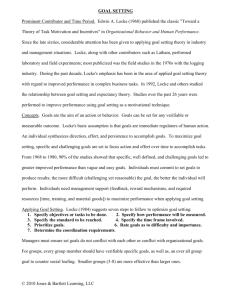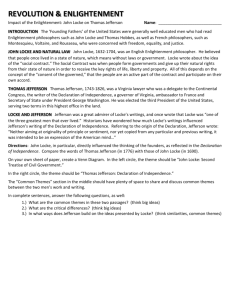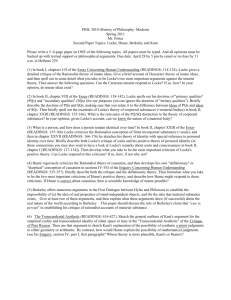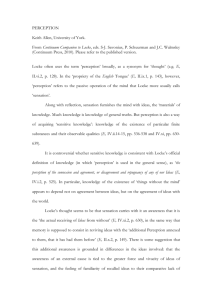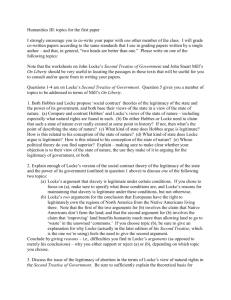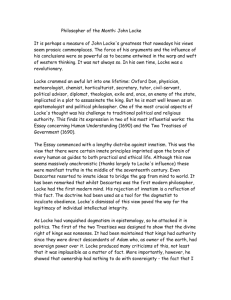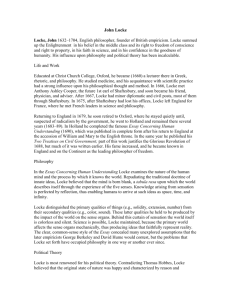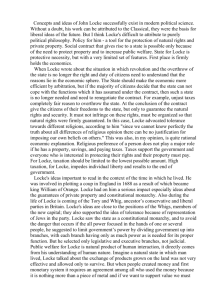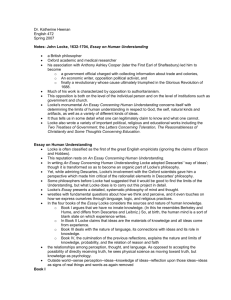John-Locke - Social Contract Theory
advertisement
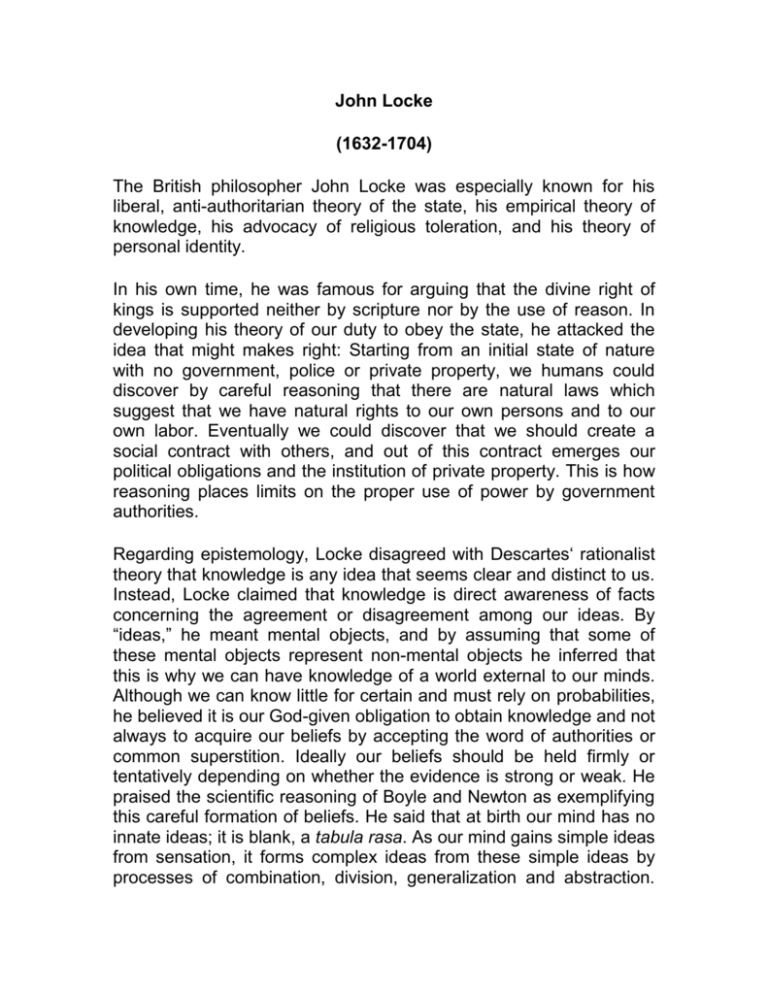
John Locke (1632-1704) The British philosopher John Locke was especially known for his liberal, anti-authoritarian theory of the state, his empirical theory of knowledge, his advocacy of religious toleration, and his theory of personal identity. In his own time, he was famous for arguing that the divine right of kings is supported neither by scripture nor by the use of reason. In developing his theory of our duty to obey the state, he attacked the idea that might makes right: Starting from an initial state of nature with no government, police or private property, we humans could discover by careful reasoning that there are natural laws which suggest that we have natural rights to our own persons and to our own labor. Eventually we could discover that we should create a social contract with others, and out of this contract emerges our political obligations and the institution of private property. This is how reasoning places limits on the proper use of power by government authorities. Regarding epistemology, Locke disagreed with Descartes‘ rationalist theory that knowledge is any idea that seems clear and distinct to us. Instead, Locke claimed that knowledge is direct awareness of facts concerning the agreement or disagreement among our ideas. By “ideas,” he meant mental objects, and by assuming that some of these mental objects represent non-mental objects he inferred that this is why we can have knowledge of a world external to our minds. Although we can know little for certain and must rely on probabilities, he believed it is our God-given obligation to obtain knowledge and not always to acquire our beliefs by accepting the word of authorities or common superstition. Ideally our beliefs should be held firmly or tentatively depending on whether the evidence is strong or weak. He praised the scientific reasoning of Boyle and Newton as exemplifying this careful formation of beliefs. He said that at birth our mind has no innate ideas; it is blank, a tabula rasa. As our mind gains simple ideas from sensation, it forms complex ideas from these simple ideas by processes of combination, division, generalization and abstraction. Radical for his time, Locke asserted that in order to help children not develop bad habits of thinking, they should be trained to base their beliefs on sound evidence, to learn how to collect this evidence, and to believe less strongly when the evidence is weaker. We all can have knowledge of God‘s existence by attending to the quality of the evidence available to us, primarily the evidence from miracles. Our moral obligations, says Locke, are divine commands. We can learn about those obligations both by God’s revealing them to us and by our natural capacities to discover natural laws. Regarding personal identity, Locke provided an original argument that our being the same person from one time to another consists neither in our having the same soul nor the same body, but rather the same consciousness. Locke’s interest centers on traditional philosophical topics: the nature of the self, the world, God, and the grounds of our knowledge of them. The closing chapters of Book IV of the Essay are devoted to a consideration of that kind of apprehension of reality which Locke calls “judgment,” as distinguished from “knowledge.” “The faculty which God has given man to supply the want of clear and certain knowledge, in cases where that cannot be hand, is judgment: whereby the mind takes its ideas to agree or disagree; or, which is the same, any proposition to be true or false, without perceiving a demonstrative evidence in the proofs”. So-called “scientific” truths being generally of this kind, one would have expected Locke to give here some account of the procedure of inductive science, some directions for the careful and methodical study of the facts, and cautions against the temptations to hasty and unwarranted generalization. But instead of this, he contents himself with general observations on the degrees of assent, on reason (and syllogism), on faith and reason, on “enthusiasm,” and on wrong assent, or error. The treatment of, that is to say, is limited to general considerations regarding the function of faith and the relations of faith and reason as guides of the human mind. Background John Locke, widely known as the Father of Classical Liberalism, was an English philosopher and physician regarded as one of the most influential of Enlightenment thinkers. Considered one of the first of the British empiricists, following the tradition of Francis Bacon, he is equally important to social contract theory. His work had a great impact upon the development of epistemology and political philosophy. His writings influenced Voltaire and Rousseau, many Scottish Enlightenment thinkers, as well as the American revolutionaries. His contributions to classical republicanism and liberal theory are reflected in the United States Declaration of Independence. Epistemology – The theory of knowledge with regard to its methods, validity and scope. The investigation of what distinguishes justified belief from opinion. Empiricism – The theory that all knowledge is derived from sense-experience. Enlightenment Period – European intellectual movement during the late 17th and 18th centuries, emphasizing reason and individualism rather than tradition.




